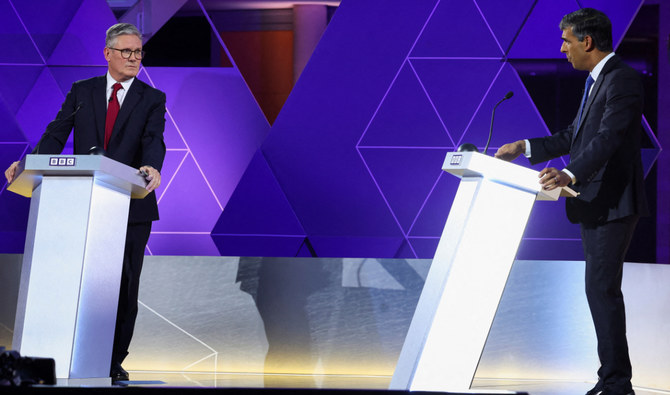LONDON: The two men bidding to be British prime minister faced off late on Wednesday in a bad-tempered, last head-to-head TV debate before the country’s general election next week.
With Keir Starmer’s Labour opposition enjoying a huge poll lead, the verbal tussle in Nottingham, central England, was premier Rishi Sunak’s last big opportunity to give his Conservatives a fighting chance on July 4.
The debate turned personal at times with Sunak accusing Starmer of “taking people for fools” over Labour’s plans to reduce immigration, while Starmer accused the wealthy Sunak of being “out of touch.”
Sunak repeatedly urged voters not to “surrender” to Labour on everything from borders to taxes, while Starmer repeated his mantra that the election represents an opportunity to “turn the page” after 14 years of Tory rule.
The two also locked horns about a betting scandal that has ensnared several senior Tories and a Labour candidate, and overshadowed talk about key policies in the campaign’s final days.
Starmer pledged to “reset politics, so that politics returns to public service,” accusing Sunak of showing a lack of leadership over the furor.
Sunak, who promised to restore “integrity, professionalism and accountability” when he was named Tory leader and prime minister in 2022, said he had been “furious” when he learned about the allegations.
“I’ve been crystal clear: anyone who has broken the rules should not only face the full consequences of the law, I will ensure that they’re booted out of the Conservative Party,” he added.
But in a sign of the public’s low opinion of politicians, one audience member’s question — “are you two really the best we’ve got?” — got loud applause.
Labour has been more than 20 points ahead in surveys for over 18 months, as Britons appear weary of Tory rule dominated by austerity, Brexit and party infighting.
Sunak has failed to reduce the deficit since he called the election on May 22, six months earlier than legally required.
His rain-sodden announcement outside Downing Street was an ominous portent of what was to come.
The Tory leader has since run a lacklustre campaign featuring blunders, and caused uproar for skipping the main D-Day anniversary with other world leaders in northern France.
He has been criticized for belatedly taking action over the betting row, which this week saw the Conservatives withdraw support from two candidates being probed by the Gambling Commission regulator for allegedly betting on the election date.
One, Craig Williams, who served as Sunak’s close aide during the last parliament, is alleged to have staked £100 ($127) three days before Sunak called the vote.
The other, Laura Saunders, is married to the Tories’ director of campaigns, who took a leave of absence when the claims became public.
The party’s chief data officer also stepped back from duties over allegations he placed dozens of bets on the election date.
Separately, Labour suspended a candidate after he bet on himself losing the election, while five police officers are also being investigated.
The regulator is thought to be looking into whether anyone had privileged information when they placed their bets.
Such flutters are allowed in the UK but using insider knowledge to make them is against the law.
The tawdry row has summed up an underwhelming campaign that has failed to galvanize the public, with polls suggesting a good chunk of the electorate made up their minds months ago.
Labour’s poll lead increased hugely in October 2022, when Sunak’s predecessor Liz Truss spooked markets and tanked the pound with billions of pounds of unfunded tax cuts.
Voters were already showing signs of becoming fed up with the Tories following the “Partygate” scandal over illegal Downing Street Covid lockdown parties, which precipitated ex-premier Boris Johnson’s fall from power.
Sunak has made a number of headline-grabbing announcements during the campaign, such as national service for teenagers, but they have failed to move the polls.
Arch-Euroskeptic Nigel Farage’s decision to run for the hard-right Reform UK party has also made his job more difficult.
Starmer, in contrast, has played it safe as he tries to preserve Labour’s lead and return the party to power for the first time since 2010.
He has stopped short of announcing new policies, instead trying to reassure voters that Labour will responsibly marshal the economy and repeating his mantra that Britain is crying out for “change.”
Despite the poll lead, Labour still requires a record swing to win a majority of one, owing to the Conservatives’ landslide win under Johnson at the 2019 election.

























